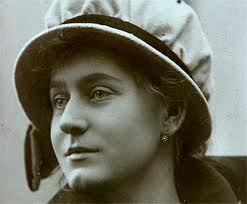Marta Baranowska
29.11.1903 (Bydgoszcz) – 07.01.2009 (Bydgoszcz)
Secretary in a law firm
Ravensbrück: 10. August 1941 – April 1945

Marta Baranowska
Marta Baranowska was born on November 29, 1903 in Bydgoszcz. Her father was a railroad worker, her mother a housewife who had to look after 10 children.
Due to the First World War and the Polish-Soviet War that followed immediately, Marta was only able to go to school regularly from 1920. She attended high school and learned Polish and German as well as English and French. In courses she learned typing and shorthand and after graduating from high school she worked as a secretary in a law firm.
In 1930 Marta married Baranowski and gave birth to three children in quick succession. Her husband worked in the school office.
After Germany invaded Poland, Marta Baranowska became involved in the Polish resistance movement against the German occupation. She headed the illegal scout organization "Mury" in Bydgoszcz. Because of her good knowledge of German, she was used as a courier for resistance work. She helped publish illegal leaflets and newspapers.
On May 28, 1941, her group was arrested and Marta was convicted of treason and belonging to a secret organization called the SSS (Death of the SS). From Budgoszcz she was deported - via the police prison at Alexanderplatz Berlin - to Ravensbrück, where she arrived on August 10, 1941. Her three children stayed with an older teacher.
In September 1941 she was appointed room elder by the supervisor on one of the access blocks. Some of the young women who arrived the next day on a special transport from Pawiak in Warsaw and from the prison in Lublin came to Marta Baranowska's block. When around 1,700 Polish women were admitted to Ravensbrück in 1942 and further barracks were built, Marta was appointed block elder of Block 13 by the superintendent in May 1942. She used her position as block elder for the benefit of the prisoners.
She became a contact person for illegal actions in which Polish women and women from other countries from different barracks worked together.
Her good contact with Ilse Hunger (D) and Anni Hand (A) from the prisoners' work assignment office helped many a Pole from her block or other inmates that they did not have to go on a transport, that they did not have mother and daughter or siblings parted or that an easier job was found for someone.
It was Marta Baranowska who helped rescue Marta Birek, a young Polish woman. Her participation in an action by the illegal resistance committee in the camp, in which three Austrian women were saved from being shot: Toni Lehr, Gerda Schindler and Edith Wexberg, is also remembered: They had come to Ravensbrück from Auschwitz in early 1945. For two of them, the Auschwitz prisoner number tattooed in the forearm had to be removed. Marta's good contacts with the sickbay made this possible.
She also took special care of the children on her block, organized food and clothing for them. In December 1944 she gave “her” children special joy with small gifts, which in turn could only be brought together through the cooperation of several women. In April 1945 she was driven out of her block on the death march together with around 500 women prisoners. On the way they were liberated.
When she got home, she went back to work as a secretary and ran a large law firm for several years. She made her memories available for the historical processing of the Polish anti-fascist resistance.
Sources: Text by Hanna Nowakowska, Warsaw, 2020; Loretta Walz: "And then you come there on a wonderful summer day", Verlag Antje Kunstmann GmbH, Munich 2005; “Ruch oporu w Ravensbrück”, 1971, pp. 137-150, as well as personal notes by M. Baranowska; S. Jacobeit / L. Thoms-Heinrich, “Way of the Cross Ravensbrück. Life pictures of anti-fascist resistance fighters ”, pp. 66-67, Leipzig 1987